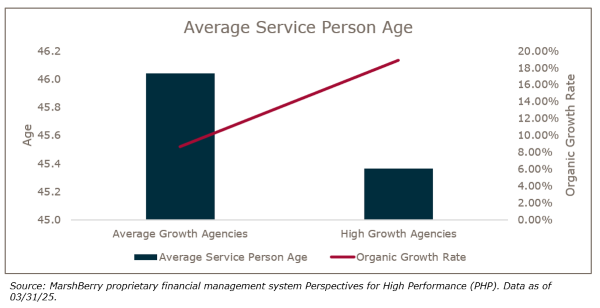Between recession-proof job stability, strong impact on the community, and consistent, reliable revenue, insurance offers a valuable and noble career. But the industry often has a problem attracting talent, particularly younger generations who have many misconceptions about the profession. If a potential employee walked into your firm, what would you want them to see? A lounge from the 1970’s or a cutting-edge tech company?
There are easy ways to win the talent war, without sacrificing growth or being disingenuous. Here are three things to consider when designing a talent strategy for attracting and retaining top performers, enhancing the company’s employer brand, and building a strong talent pipeline.
Invest in the workplace
Start with self-analysis – does your company workspace inspire confidence? Reinvesting in the office space, tools, and technology makes people more effective at their job. A clean, functional, stocked office is probably obvious, but things like modern décor, comfortable, practical office furniture, and inviting, collaborative spaces make workers productive, leading to improved results.
While investing in a fresh coat of paint or new equipment may seem frivolous, firms see the benefit in ways beyond attracting talent. For example, according to MarshBerry’s proprietary financial management system Perspectives for High Performance (PHP) and MarshBerry’s Employee Engagement Survey, firms with highly engaged employees report an average EBITDA margin of 21%, a 2.4% advantage over other firms. These firms also see an increase in Total Commissions & Fees per person for both Production personnel (32%) and Service personnel (27%). Most importantly, these firms achieve a 12.4% average organic growth rate, compared to 7.9% for firms with lower employee engagement.
Evaluate your in-office, work from home policies to make sure you are competitive in the market. Many employees desire hybrid work flexibility, but MarshBerry’s 2025 Insurance Agency & Brokerage Compensation Report indicates only 50% of surveyed firms allow some remote work, with a majority mandating their employees be in the office three days a week. If you desire in office, keep in mind that if their home office is nicer than the actual office, why would they be excited to come into work?
Make a stellar first impression
Now that the workplace is comfortably modern and you’ve identified the company’s top features for attracting talent, it’s time to sell that story externally. Typically, the first impression candidates will have of a company is its digital presence. LinkedIn, the company website, the recruiting pitch, even the job application process all tell a story about the business. What do you want that story to be? This is where employer branding can have the biggest impact.
Employer brand is the way job seekers (and current employees) see an organization’s culture, values, and employee experience. A strong employer brand can attract top talent, improve employee retention, and enhance overall company reputation. To improve employer brand, firms should:
- Ensure the business’ LinkedIn page is active and up to date.
- Confirm the company webpage is modern, functional, and easy to navigate.
- Share stories of the organization’s innovative products, company wins, or community involvement.
- Enhance images and descriptions of the work environment and day-to-day experience.
- Make job advantages clear, such as career development opportunities, job security, work-life balance, employee perks, and employee recognition.
- Review your interview process. If it takes four interviews and a month to complete, it is too long. Are you asking the right questions and can clearly articulate your value proposition?
An employer brand should be authentic and reflect the true employee experience, not marketing fabrication. Ultimately, consider this question: Would you work for you?
Promote growth opportunities
Many companies fall into a trap of promoting cool workspaces and interesting perks, but neglect to share the story of the day-to-day experience. To attract high performers, include more than just basic tasks in the job description. Share the ways the firm helps employees succeed in their job, such as providing thorough training, instilling a strong sales culture, or using the latest technology and tools. Most importantly, convey the firm’s commitment to growth opportunities for all employees. Remember that firms are competing with all workplaces for talent, not just other brokerage firms. One issue is that sought-after talent often gravitates to so-called “cool” employers. What they don’t realize is that, by working at an insurance brokerage firm, they can partner with interesting companies and gain deep insights into many industries. Talk about those opportunities throughout the recruiting process. Firms that truly have a long-term plan for growth invest in the next generation of leaders. This doesn’t mean younger is better, it means hiring talent who can eventually move up and replace retiring leaders. According to MarshBerry’s PHP, the Best 25% of firms (based on their financial performance, specifically organic growth) have a WASA (Weighted Average Shareholder Age) of 44 years old, compared to the overall average of 54.2 years old. A lower WASA increases the likelihood of retaining top talent and improves growth potential. Beyond WASA, firms that have a lower average service team age outperform others when it comes to organic growth. As shown in the chart below, as the age of service teams goes down, growth goes up.

To attract younger generations, the firm’s career webpage should show career advancement opportunities, examples of coaching, training, and mentoring, skills development programs or courses, and work-life balance or flexible work arrangements. Offering these features shows new talent that they can have long, advantageous careers at your company, including opportunities to be future leaders.
These upgrades and insights will be useful throughout the talent attraction and retention process. Sell the value of the organization, how the team has made a difference for clients, and that working at your company offers a sense of purpose and an opportunity to make a difference.
